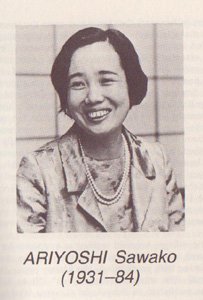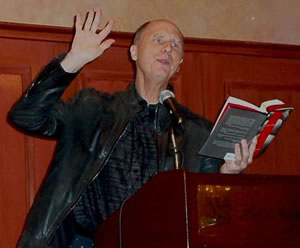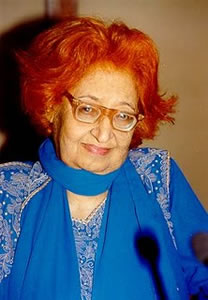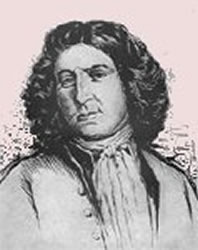De Amerikaanse dichter en letterkundige Edward Hirsch werd geboren op 20 januari 1950 in Chicago. Zie ook mijn blog van 20 januari 2009.
Poor Angels
At this hour the soul floats weightlessly
through the city streets, speechless and invisible,
astonished by the smoky blend of grays and golds
seeping out of the air, the dark half-tones
of dusk suddenly filling the urban sky
while the body sits listlessly by the window
sullen and heavy, too exhausted to move,
too weary to stand up or to lie down.
At this hour the soul is like a yellow wing
slipping through the treetops, a little ecstatic
cloud hovering over the sidewalks, calling out
to the approaching night, “Amaze me, amaze me,”
while the body sits glumly by the window
listening to the clear summons of the dead
transparent as glass, clairvoyant as crystal.
Some nights it is almost ready to join them.
Oh, this is a strange, unlikely tethering,
a furious grafting of the quick and the slow:
when the soul flies up, the body sinks down
and all night—locked in the same cramped room—
they go on quarreling, stubbornly threatening
to leave each other, wordlessly filling the air
with the sound of a low internal burning.
How long can this bewildering marriage last?
At midnight the soul dreams of a small fire
of stars flaming on the other side of the sky,
but the body stares into an empty night sheen,
a hollow-eyed darkness. Poor luckless angels,
feverish old loves: don’t separate yet.
Let what rises live with what descends.
Branch Library
I wish I could find that skinny, long-beaked boy
who perched in the branches of the old branch library.
He spent the Sabbath flying between the wobbly stacks
and the flimsy wooden tables on the second floor,
pecking at nuts, nesting in broken spines, scratching
notes under his own corner patch of sky.
I’d give anything to find that birdy boy again
bursting out into the dusky blue afternoon
with his satchel of scrawls and scribbles,
radiating heat, singing with joy.

Edward Hirsch (Chicago, 20 januari 1950)
De Turkse schrijver Nazim Hikmet werd op 20 januari 1902 geboren in Thessaloniki. Zie ook mijn blog van 20 januari 2007 en ook mijn blog van 20 januari 2008 en ook mijn blog van 20 januari 2009.
De reus met de diepblauwe ogen
Er was eens een reus met diepblauwe ogen
Hij beminde een heel kleine vrouw
Die droomde van een huisje met een tuin
Waarin gevlamde kamperfoelies bloeiden.
De reus had lief als een reus
Zijn handen waren groot voor grote dingen
Nooit hadden zij de muren kunnen bouwen of het belletje doen schellen
Van het huisje met de tuin waarin gevlamde kamperfoelies bloeiden.
Er was eens een reus met heel blauwe ogen
Hij beminde een heel kleine vrouw
Zij was heel aardig, maar werd vlug moe.
Op de grote wegen van de reus
Had ze zich behaaglijk willen voelen.
Ze zei vaarwel aan de diepblauwe ogen
En in de armen van een rijke dwerg
Liep ze het huisje binnen met een tuin waarin gevlamde kamperfoelies bloeiden.
Nu begrijpt de reus
Dat de liefde van een reus
Zelfs niet mag begraven worden
In het huis waarin gevlamde kamperfoelies bloeien.
Vertaald door Paul Snoek
De dode op het Beyazitplein
Er ligt een dode
een jongen van negentien
bij dag onder de zon
bij nacht onder de sterren
op het Beyazitplein in Istanbul.
Er ligt een dode
in de ene hand een leerboek
in de andere hand zijn vermoorde droom
april in het jaar negentienhonderdzestig
op het Beyazitplein in Istanbul.
Er ligt een dode neergeschoten
de wonde aan zijn voorhoofd
gaat open als een rode anjer
op het Beyazitplein in Istanbul.
Er zal een dode liggen
zijn bloed zal zo lang op de grond druppen
tot mijn volk met de wapens
met vrijheidsliederen
het machtige plein zal heroveren.
Vertaald door J. Iven en P. Eydemir
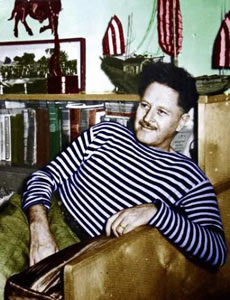
Nazim Hikmet (20 januari 1902 – 3 juni 1963)
De Duitse (Luxemburgse) schrijver Guy Helminger werd geboren op 20 januari 1963 in Esch-sur-Alzette. Zie ook mijn blog van 20 januari 2007 en ook mijn blog van 20 januari 2008 en ook mijn blog van 20 januari 2009.
Uit: Pelargonien (Etwas fehlt immer)
„Es gab wenig, das Frank Perl so erfreute wie das Fahrradfahren. Da waren Tage, an denen hob er sich morgens kurz nach dem Frühstück in den Sattel, und erst wenn es dunkel wurde, merkte er, daß er die ganze Zeit nichts gegessen hatte. Er fuhr in der Stadt herum, und ab und an, wenn es sich anbot, wenn er wußte, daß es ihm dieses seltsame Glücksgefühl bescheren würde, ließ er den Lenker los, richtete sich auf und schlug einem Passanten im Vorbeigleiten auf den Hinterkopf. Er drehte sich danach nie um, schaute sich nie die überraschten Mienen der Gedemütigten an. Er fuhr einfach weiter, wissend, daß die Gesichter in seinem Rücken in all ihren stumpfen Variationen doch immer mit dem gleichen Ausdruck völliger Sprachlosigkeit über dem Bürgersteig hingen, während in seiner Brust im selben Moment eine Sauerstoffflasche geöffnet wurde und etwas sich aufrichtete in seinen Gliedern.
An sehr schönen Tagen radelte Perl nach so einem Schlag einmal um den Block und steuerte sein Opfer erneut an.
Die Stadt hatte etwas von einem riesigen Blumenkasten, in dem die vom Vorjahr übriggebliebenen Erdbrocken sich zu kleinen schimmeligen Wohneinheiten strukturierten. In den Furchen dazwischen lief die eine oder andere Kellerassel, erschrocken über so viel Licht, das plötzlich über den Dachgiebeln stand und von dort aus jede noch so verwinkelte Ecke ausputzte. Nur die Blumen fehlten.
„Etwas fehlt immer“, sagte Perl und faßte sich ans rechte Ohr.
Er sah die Wagen, die sich langsam und laut aus der Stadt hinaus Richtung Autobahn schoben, sah, wie ihre Schatten stotterten, län-ger wurden, sich in aller Ruhe ausdehnten und wie Geisterfahrer die Gegenfahrbahn benutzten, während sein Rad ihn fast lautlos und gleichmäßig über den Bürgersteig ans Ende des Tages trug.“

Guy Helminger (Esch-sur-Alzette, 20 januari 1963)
De Zwitserse dichter en schrijver Eugen Gomringer werd op 20 januari 1925 geboren in Cachuela Esperanza, Bolivia. Zie ook mijn blog van 20 januari 2007 en ook mijn blog van 20 januari 2009.
schweigen schweigen schweigen
schweigen schweigen schweigen
schweigen schweigen
schweigen schweigen schweigen
schweigen schweigen schweigen
gleichmässig gleich gleichmässig ungleich ungleichmässig
gleich ungleichmässig ungleich gleichmässig
gleich
gleichmässig ungleich ungleichmässig gleich
ungleichmässig ungleich gleichmässig gleich gleichmässig
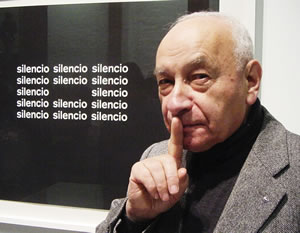
Eugen Gomringer (Cachuela Esperanza, 20 januari 1925)
De Israëlische schrijfster, journaliste en literatuurwetenschapster Batya Gur werd geboren op 20 januari 1947 in Tel Aviv. Zie ook mijn blog van 20 januari 2008 en ook mijn blog van 20 januari 2009.
Uit: The Saturday Morning Murder (Vertaald door Dalva Bilu)
„It would take years, Shlomo Gold knew, before he would be able to park his car in front of the Institute on Disraeli Street without feeling a cold hand gripping his heart. Sometimes he even thought that the analytic society should change its prernises from Talbieh, just so he would not have to feel this recurrent anxiety. He had also considered requesting special permission to treat his patients elsewhere, but his supervisors thought that he should confront the situation with his own inner resources and not by means of external changes.
He could still hear old Hildesheimer’s words reverberating in his mind. The building was not the issue, the old man had said: it was not the budding that was causing his anxiety; it was his own feelings in relation to the event. Ever since the day it had happened, Gold heard the words, in their heavy German accent, whenever he approached the building. Especially the sentence about how it was his own emotions he had to face, not the stone walls.
Naturally, Hildesheimer had said then, the fact that it was his,Gold’s, analyst, who was involved had to be taken into account, and perhaps — the old man gave him a shrewd, inquiring look-he should try to “derive the maximum from the difficulties of the situation.” But Shlomo Gold, who had once been so proud of being given the keys to the building, could no longer enter his room at the Institute without an anxiety attack.“

Batya Gur (20 januari 1947 – 19 mei 2005)
De Tsjechische dichter, schrijver en filosoof Egon Bondy werd geboren op 20 januari 1930 in Praag. Zie ook mijn blog van 20 januari 2009.
Uit: Hatto (Vertaald door Mira Sonnenschein)
„Der Erzbischof begann nun damit, die wertvollen Gaben zu zeigen, die er kürzlich von den Herzögen erhalten hatte, weil sie seine Unterstützung bei der Forchheimer Wahl suchten: Goldenes und silbernes Geschirr, kostbare Stoffe und seltene Pelze, aber auch Kuriositäten und wertvolle Nichtigkeiten wie die Federn eines Pfaus oder der Schwanz eines Basilisken befanden sich darunter ebenso wie eine antike Karte mit der Darstellung der Erde. Der Erzbischof entfaltete die Rolle, um sie sodann voller Stolz als ein Geschenk der Gesandtschaft des westfränkischen Königs zu präsentieren. Er betonte, sie sei wahrhaftig römischen Ursprungs, da hier, wie er erklärte, Jerusalem entgegen der Wahrheit nicht in der Mitte der Welt dargestellt worden war. (Tatsächlich handelte es sich, obgleich die Karte schon einige Jahrhunderte alt sein musste, um eine von einem ungelehrten Mönch angefertigte Kopie späteren Datums.) Für alle erkennbar war Jerusalem nachträglich in den asiatischen Teil eingezeichnet worden. Lesen konnten die Karte allerdings nur der Erzbischof, Salomon und Hatto. Die drei beugten sich also über das äußerst seltene Werk. Keiner von ihnen hatte eine solche Karte öfter als ein-, zweimal zu Gesicht bekommen. Zuerst konnte Hatto die Umrisse Italiens, dann aber auch schon leicht die des Mittelmeers erkennen. Oberhalb im Süden Afrika, unten der Norden mit Gallien und Germanien und noch etwas tiefer die skandische und die englische Insel. Ganz unten jenes Ultima Thule, ein häufiger Gegenstand seiner Überlegungen. Links im Osten zog sich das Festland bis zum Land der Serren hin. Im Westen endete es mit einigen Halbinseln im Ozean. Auch die größten Gebirgsketten und Flüsse waren auf der Karte eingezeichnet. Doch Hatto benötigte eine Weile, bis er erkannte, wo das eigene Land zu finden war. Der Erzbischof, der bereits einige Zeit dem Studium der Karte gewidmet hatte, deutete den geschätzten Gästen mit seinem Finger die entsprechenden Umrisse an. Da – und da – und hier. Hier leben schon die Sarazenen und von hier aus ziehen die Heiden los. Hatto betrachtete das Pergament mit größter Aufmerksamkeit. Es war ein sehr seltsames Gefühl, alles auf einer so kleinen Fläche, auf der eine so große Stadt wie Mainz gar nicht auffiel, aufgezeichnet zu sehen. Er folgte konzentriert dem Finger des Erzbischofs, ja er forderte ihn auf, alles noch einmal zu zeigen …“

Egon Bondy (20 januari 1930 – 9 april 2007)
Zie voor nog meer schrijvers van de 20e januari ook mijn vorige blog van vandaag.

